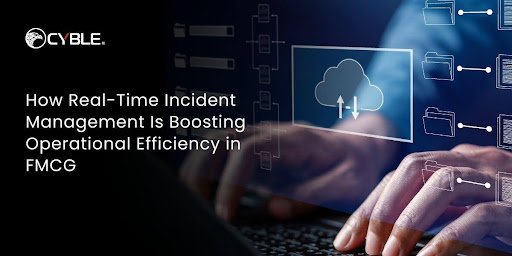FMCG companies operate in a world of high-volume production, low margins, and very tight deadlines. Any disruption spills throughout the value chain. Thus, operational efficiency in FMCG incident management cannot merely be about saving a few precious minutes; it is about protecting the brand and customer trust.
Likewise, a milk processing unit could face quality control dilemmas that prolong the delay in responding whereby subpar batches leave the factory. This, clearly, is far beyond monetary loss, it is beyond breach of a bond between their consumers. With real-time operations monitoring, any potential problem is flagged right away and corrective action is taken before it develops into a risk.
It is this sort of proactive methodology that puts incident management systems FMCG on radar as must-haves for any modern corporation. In conjunction with real-time incident management, it will decide whether companies will finally be able to guarantee smooth and efficient working of their operations.
Enhancing Operational Efficiency in FMCG Companies
Imagine a scenario where a retailer reports delayed deliveries due to a logistics issue. With FMCG incident response real time, the supply chain team can track the disruption, reroute deliveries, and inform the retailer, all in one streamlined process. This not only saves time but also strengthens relationships with partners.
The connection between real-time incident management in FMCG and efficiency is clear: fewer disruptions mean more consistent output. Here is how it translates into everyday operations:
- Faster decision-making: Automated alerts reach the right teams immediately, ensuring issues are handled before they spread.
- Reduced downtime: Quick resolution means machinery and processes are back online in minutes, not hours.
- Better collaboration: Teams from production, IT, and supply chain work on a single platform to address incidents.
Real-Time Operations Monitoring in FMCG
Real-time monitoring is the foundation for effective FMCG incident management systems. It provides complete visibility through production lines, warehouses, and distribution channels.
For example, in the case of a soft drink bottling plant, if the temperature level for storage tanks exceeds safe limits, sensors connected to the real-time operations monitoring FMCG alert supervisors immediately. The team can regulate temperature parameters before the product is damaged. Without this visibility, this problem could lead to the recall of thousands of bottles from the market.
Real-time tracking provides confidence to both executives and frontline workers. Everyone understands that problems will not stay concealed until it is too late.
How Incident Management Improves Efficiency in FMCG
So, how does incident management enhance the efficiency of manufacturers in the FMCG sector? Visibility and speed are the answer. With every incident, small or big, being tracked and managed in real time, spotting patterns becomes an easy task for organizations. Recurring problems lead organizations to preventive maintenance, thus lowering the chances for the same disruptions to happen again.
It is like maintaining a car. If you only have your car checked when it breaks down, disruptions will come your way every so often. Monitoring the car performs well daily, and minor issues that could adversely affect the car in the long run are detected. Similarly, in real-time incident tracking, FMCG operations help the companies to transform themselves from a reactive mode to a proactive mode.
Such occasions are created by Cyble’s Incident Management module and many more. Alerts get consolidated into actionable incidents within the platform for faster resolution and better collaboration among different teams. Integrated incident handling means less downtime, smoother production lines, and dependable supply chains.
Having one system under which operations are organized enables FMCGs to act faster and stay on top in competitive markets.
Real-Time Incident Response in FMCG Companies
In fast-moving consumer goods companies, incident response in real time provides an advantage that allows the operations to stay predictable and the customers to be satisfied.
Take, for example, a global cosmetic company that has issues with raw materials arriving, due to inclement weather. Because the FMCG operation disruption management expertise and technology is real time, the equivalent tools can be used to reroute their logistics, refresh their distributors, and make sure the final customer does not run out of product.
This speed of response is what separates the leaders of the market from those that are hesitant.
Industry-Wide Adoption of Incident Management Systems in FMCG
Different sectors within FMCG are already reaping the benefits of incident management systems FMCG:
- Food and Beverage: Real-time tracking ensures compliance with safety regulations and minimizes product recalls.
- Personal Care: Incident response systems maintain production uptime to meet constant customer demand.
- Household Goods: Monitoring tools reduce supply chain delays and ensure retailers are always stocked.
Across each of these categories, the core objective is the same, boosting operational efficiency in FMCG companies through fast and effective incident response.
Conclusion
Predictive analytics and AI-powered automation may form the next wave in real-time incident management in FMCG. Instead of being in an afterthought of incidents; companies must be able to predict them. For example, a machine learning model may be built to predict when it is likely for a conveyor belt to fail and undertake maintenance prior to actual breakdown.
Integration with security posture tools will also come into play. Managing disruptions will go together with securing operations against digital threats. Working hand in hand with incident management tools with the likes of CSPM (Cloud Security Posture Management) will ensure that FMCG companies build resilience at every level.
Consequently, the evolution of technology will bring about a situation where incident response will not just resolve incidents at a faster rate in FMCG companies but make these incidents predictable and stoppable, therefore placing a new kind of operational efficiency for tomorrow.
Experienced SEO Specialist and Web Developer with a strong focus on off-page SEO and guest posting. With 3 years of proven expertise, I help businesses improve their search rankings and build sustainable online presence.
